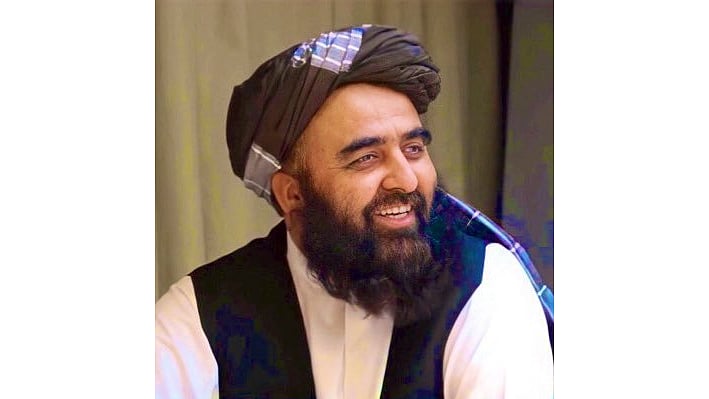
Afghanistan's Acting Foreign Minister Amir Khan Muttaqi
Credit: X/@FMMuttaqi
New Delhi: India is set to host Amir Khan Muttaqi, the acting foreign minister of the Taliban dispensation in Afghanistan, from October 9 to 16, as the United Nations Security Council exempted him from the travel ban imposed on him and other leaders of the Sunni Islamist organisation.
He is the first Taliban leader whom the Government of India would officially host in New Delhi. His meeting with External Affairs Minister S Jaishankar in New Delhi would be India’s highest-level engagement with the Taliban in 25 years. The last one had taken place in December 1999, when the then external affairs minister, Jaswant Singh, had a meeting with the Taliban government’s Foreign Minister Wakil Ahmed Muttawakil in Kandahar and handed over to him three terrorists, including Jaish-e-Mohammad chief Masood Azhar, to secure the release of the crew and the passengers of the hijacked Indian Airlines flight IC-814.
His visit to New Delhi was tentatively scheduled to take place last month. But it was postponed due to the delay in securing the exemption from the UN Security Council. The diplomats of India and Russia worked together at the UN to get the Security Council’s exemption for his visit to New Delhi, the sources told DH.
New Delhi is set to host the foreign minister of the Taliban government in Kabul at a time when China has started mediating between Pakistan and Afghanistan, nudging them to mend the ties. The relations between the Taliban and its mentor, Pakistan, turned sour over the past couple of years. Islamabad has been accusing the Taliban of not doing its bit to deny the terrorist organisation, Tehreek-e-Taliban, a safe sanctuary in Afghanistan and allowing it to carry out strikes in Pakistan.
Muttaqi and Foreign Secretary Vikram Misri had a meeting in Dubai early this year, as India stepped up its engagement with the Taliban.
New Delhi has not yet formally recognised the so-called government that the Taliban set up after returning to power in Kabul on August 15, 2021.
Unlike in 1996, New Delhi had not formally shut down its embassy in Kabul after the return of the Taliban to power after two decades. It evacuated its envoy and other diplomats from Afghanistan in August 2021 but sent back a “technical team” less than a year later to run its mission in Kabul and coordinate the delivery of humanitarian aid – food and medicines – from India.
New Delhi had several rounds of engagements with the leaders of the Taliban in the past two years, including a meeting between a senior diplomat of India and Afghanistan’s “acting defence minister”, Mullah Muhammad Yaqoob, the son of the militia’s late founder Mullah Muhammad Omar, on November 6, 2024. India’s outreach to the Taliban is apparently aimed at stopping its strategic rivals Pakistan and China from turning the Sunni Islamist group’s return to power in Afghanistan into an advantage.
Less than a week after having a phone call with Indian External Affairs Minister S Jaishankar and condemning the April 22 carnage in Jammu and Kashmir by a gang of Pakistani and Pakistan-trained terrorists, Taliban Foreign Minister Mawlawi Amir Khan Muttaqi travelled to Beijing on May 20 and had a meeting with his counterpart in the Chinese Government Wang Yi. Muttaqi also had a meeting with Pakistani Foreign Minister Ishaq Dar, who was already on a visit to China. Wang later had a trilateral meeting with Muttaqi and Dar.
Muttaqi, Dar and Wang agreed to “deepen cooperation in jointly building infrastructure under China’s 'Belt and Road Initiative' and “promote the extension of the China-Pakistan Economic Corridor (CPEC) to Afghanistan”. They also agreed to strengthen the construction of regional interconnection networks.
New Delhi opposed the CPEC 1.0 as it violated the sovereignty and the territorial integrity of India. The 3000-km-long connectivity project, a flagship component of the Belt and Road Initiative envisaged by Chinese President Xi Jinping, linked China’s Xinjiang Autonomous Region and the port city of Gwadar in southern Pakistan. It covered India’s territory in J&K under illegal occupation by Pakistan. China pledged to invest $ 65 billion in infrastructure projects along the CPEC, including the territories of India occupied by Pakistan.
The CPEC 2.0 – an upgraded version of the CPEC 1.0 – is likely to allow China to spread its tentacles not only in Pakistan and areas illegally occupied by Pakistan but also in Afghanistan, posing a strategic challenge to India.
